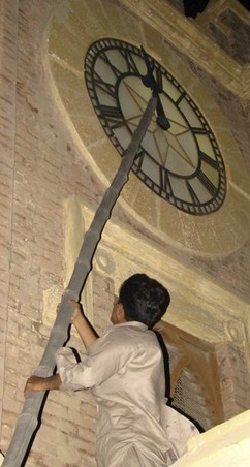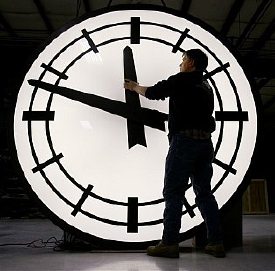Adil Najam
 As of the stroke of midnight Saturday-Sunday (May 31-June 1, 2008) Pakistan officially advanced its clocks by one hour. This “daylight savings” move is a bid to conserve energy in an increasingly energy strapped economy in conditions where everyone agrees that the energy situation is going to get worse well before it gets any better.
As of the stroke of midnight Saturday-Sunday (May 31-June 1, 2008) Pakistan officially advanced its clocks by one hour. This “daylight savings” move is a bid to conserve energy in an increasingly energy strapped economy in conditions where everyone agrees that the energy situation is going to get worse well before it gets any better.
The change puts Pakistan six hours ahead of the GMT. This change will last for three months; June-August.
Dawn reports that:
the energy conservation package approved by the Federal Cabinet on May 14 also envisages that during the next three months (June-August), all shopping plazas will close business after 9 p.m. and switch over their weekly holidays from Sunday to Friday, while industries will similarly stagger their weekly offs; WAPDA will not supply power to billboards using lights besides management of street lights. Under Cabinet’s directive the use of air conditioners will be stopped from 8 a.m. to 11 a.m. in Prime Minister House, Secretariat and other government offices, while one million energy saver bulbs will be purchased to promote culture of installing such bulbs across the country. The government has already set up a task force to control line losses.
The energy situation in Pakistan is precarious indeed. The economic loss that is being caused by it has to be immense. In all major cities, one seems to spend the entire day waiting for or recovering from the last load-shedding. Indeed, the economic working day in Pakistan is better described as the few hours of electricity in an otherwise electricity-less day, rather than by the hours of load-shedding within a “normal” flow of electricity.
The economic loss has to be measured not only by the economic value that is lost because of the lack of electricity, but also but the resources that are being diverted towards the expenditures necessitated by the new “load-shedding economy.” Those who can afford to, and many who can not, are being forced to spend obnoxious amounts of ineffective, uneconomical, noisy and polluting generators. Those who cannot, try out UPS solutions and the markets are flooded by over-priced and under-performing Chinese “rechargeable” lights and fans (some with built-in radios and other gimmicks). Most, however, have no options but to get used to the new status quo where people are already beginning to describe th day not by how many hours of load-shedding they have but by how many hours of electricity they get!
So, is “daylight savings” the answer? Or, at least, part of the answer?
 The history and reality of the idea of daylight savings is itself a fascinating one. The book, Spring Forward: The Annual Madness of Daylight Saving Time by Michael Downing, is a most fascinating account of the history and efficacy of the idea and it is not clear just how useful – if at all – the concept has been in actually saving energy.
The history and reality of the idea of daylight savings is itself a fascinating one. The book, Spring Forward: The Annual Madness of Daylight Saving Time by Michael Downing, is a most fascinating account of the history and efficacy of the idea and it is not clear just how useful – if at all – the concept has been in actually saving energy.
To look on the bright side, the decision shows that a certain seriousness has emerged in Pakistan to think seriously about conservation solutions. Everyone seems honestly interested in it. And, quite clearly, conservation has to be a key step. However, this along with the other steps in the new Energy Conservation Plan, even if appropriate, seem like an inadequate attempt to respond to a crisis that demands much more bold strategies.
A simple chronicle of just some of the many posts ATP has carried on the topic shows just how serious a crisis we are in and how much worse it is likely to become:
The Violence of Energy Insecurity
KESC, Karachi and Power Outages
Multiple Crises in Pakistan
Karachi Suffering the Heat
Bijli Bachao Mohem!
Andhair Nagri
Bijli Nama



















































I agree, this is a gimmick that is going to confuse people and produce no results. We need much more serious action. To start with some conservation should be regulated. For example, start issuing fines to offices that have ACs on before 11 or to shops, weddings, etc. that have excessive lights on or on for too late. You start slapping these fines and people will start changing their behavior.
Actually we do not have good governance,so entire system mess.We see loadshedding in houses and business places and industries,but we are having high powered bulbs ,neon signs on streets and advertising boards.During day upto 11 or 12 pm, street lights not been put off.Kunda system is in full swing ,no one cares.Lacs of rupees are due from Govt.and non-govt institutions-organisations.what the recovery staff doing till now.So first thing is to correct the system.In our country running on adhoc basis.Problrm never solved at once,matters delayed/prolonged intentionally to keep politics alive,no care for county or the people.politicians are worst in comparision to Musarraf.
From the point of view of a software develper, it’s a terrible idea to change time with such a short notice. I have worked on these issues before and I feel sorry for any programmers out there scrambling to put together a solution. People may not realize how sensitive most software is to time/time zone issues and fixing them is not always trivial. As Khalid said below “I don
The original intent of daylight saving when it was started to be introduced in the first quarter of the 20th century was to use more daylight in higher latitude countries in summer. Saving in electricity comes about by less use of lighting. There is potentially less saving in lower latitude countries.
Further, in warmer climes, considerable electricity is consumed during the daytime for cooling purposes – fans, airconditioners etc. An interesting recent study in a US state, where some counties implemented DST and others didn’t, showed that counties with DST actually consumed more electricity compared to those that didn’t. To some extent, that would apply to Pakistan too, though our use of ACs is proportionately a lot less .
Also, most Pakistanis already live according to the natural cycle of the day, from Fajr to Isha prayers, so changing the clock will not significantly affect their waking hours.
I don’t think this experiment, being tried for the second time, has really been thought through.
A new, rather interesting, picture has been added to the top of this post. This Associated Press picture from Hyderabad, Sindh, shows a man using a bamboo pole to change the time on a clock tower.